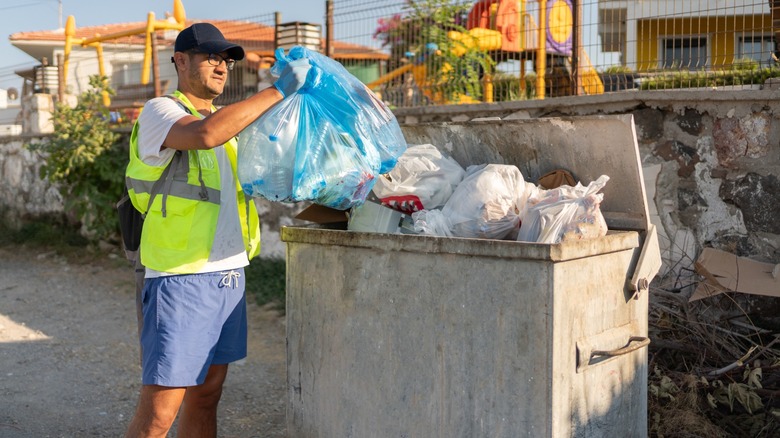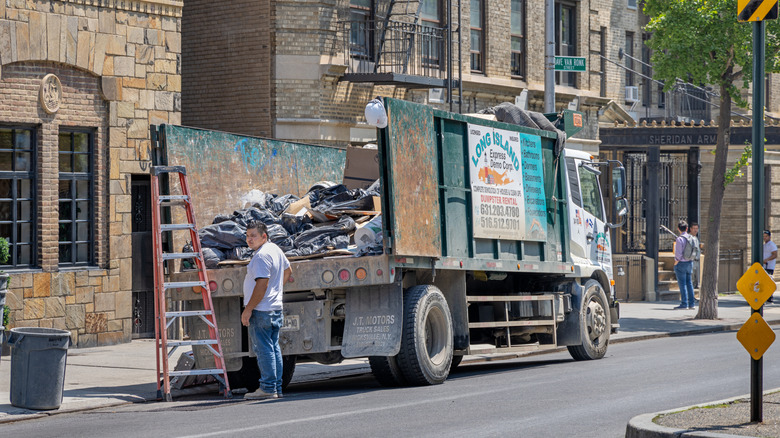The New York 'Dumping' Policy That Could Make You $2,000 Richer
A little-known fact about United States law is that it often rewards snitching. An anonymous whistleblower made $279 million for reporting corporate fraud to the U.S. Securities and Exchange Commission (SEC) in 2023 (via The Wall Street Journal), for instance, and the Internal Revenue Service (IRS) gave Bradley Birkenfield a $104 million reward in 2012 (via Reuters) for giving information leading to arrests. Whistleblower programs have led to scandalous bankruptcies and headline-grabbing arrests, but even reporting certain minor infractions can make for a pretty nice payday.
New York City has opened up the avenue for anyone to make thousands of dollars for snitching on litterers. It's certainly not as fancy as the SEC or the IRS's Whistleblower Program, but the New York City Department of Sanitation (DSNY) has been waging its own war against filth since the 19th century, back when it was known as the Department of Street Cleaning. In modern times, brooms and brushes have been replaced with eyewitnesses and smartphones.
Through DSNY's Illegal Dumping Award Program, you could report illegal dumping you personally witnessed or provide a tip for catching someone in the act, and the state could give you up to 50% of the fine. Under NYC law and DSNY guidance, these fines start at $4,000 and can go up to $18,000 for repeat offenders within 18 months. That means as a whistleblower, you could easily make $2,000 if the person you report is found and fined.
Important details about the DSNY's reward program
Like most government reward programs, it's vital to read the fine print. Much like how some New York City tourist attractions may not be worth the price of admission, there are only certain instances of dumping that could be worth your time to report. If you do things the wrong way, you won't be able to claim your reward, and all your effort and time could go to waste. Luckily, DSNY's award program seems pretty straightforward.
The most important thing to note is that the "illegal dumping" for this reward only refers to vehicles. So, witnessing a random pedestrian throw a Starbucks cup on the sidewalk won't earn you the reward. However, if you see a construction truck offload a bunch of scrap wood in an empty lot, you may have a valid report on your hands. There doesn't seem to be much restriction on what kind of material counts for this kind of dumping; household waste, trade waste, dirt, sand, gravel, and both inorganic and organic materials all count according to the New York City Administrative Code.
It's also worth noting the fine must be issued and paid before you can claim your reward. If the dumper contests the ticket, then you may have to attend a hearing at the Office of Administrative Trial and Hearings (OATH).
What steps do you have to take to earn your reward?
This reward program doesn't apply to DSNY employees, peace officers, OATH staff, or employees of DSNY contractors. If you don't fall into any of those groups, you could be eligible for the reward, just don't approach or address the people you witness dumping. Next, if you have a phone or camera, DSNY encourages witnesses to record videos of the vehicle actively dumping — just make sure to get a clear shot of the license plate. If you don't have a camera, you can note the vehicle description, the type of material dumped, where it was dumped, and when.
To make your report, you should download an illegal dumping complaint affidavit, fill it out, have it notarized, and mail it to the Director of Enforcement's office — the address is on the DSNY Illegal Dumping page. If you have a video, email it to IllegalDumpingTips@dsny.nyc.gov. Then, just wait for the DSNY to conduct its own investigation. If your evidence is solid, DSNY may issue a summons under Admin Code §16-119 and impound the vehicle. If the dumper doesn't contest, the fine is imposed and must be paid. If they contest, you're expected to show up as a witness. Once the fine is collected, DNSY can award up to 50%. Since most fines start at $4,000, you could end up with around $2,000.
Please note that this program is only for New York City and not the state. If you're looking for statewide programs, you could look into New York's $500 energy bill discount.


